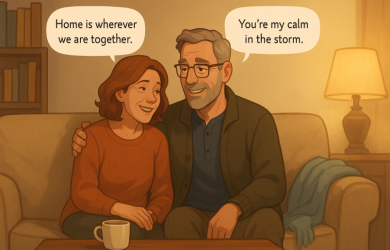10 Ways On How Low Self-Esteem Affects a Relationship

Heal & Grow Daily for a Happier Relationship
Subscribe FREEKey Takeaways
Marriage.com AI Quick Summary
Self-esteem in relationships is vital. Some people would often talk about respect, love, communication, and intimacy, but self-esteem and relationships also go hand in hand.
Why is this so? What does it mean if you have low self-esteem in a relationship? How does this affect your relationship and your partner?
Self-esteem is important for each and every one of us.
It’s your opinions, beliefs, and even how you view yourself that determines how you perceive and value yourself.
But the thing is, self-esteem is different for each person, and it changes depending on life experiences, past relationships, and how you talk to yourself.
Unfortunately, if you have low self-esteem, it could affect not only your work, and productivity but also your relationship.
What causes low self-esteem?
Self-esteem and relationship psychology are connected because they affect a person’s attachment style. It also predicts if your love for each other will survive.
According to Silvana Mici, a licensed psychologist:
From a therapist’s perspective, I believe that people with low self-esteem may feel insecure in their relationships, constantly seeking reassurance from their partner and fearing rejection or abandonment.
But first, we want to understand what causes low self-esteem.
Life is different for everyone. There may be events that could change your self-esteem. Here are some examples:
- Unrealistic beauty expectations through social media, magazines, and ads
- Trauma from a previous relationship
- Experiencing racism, judgment, and social stigma
- Being bullied
- Abuse
- Medical or physical conditions
- Separation or divorce
- Not graduating or losing a job
Some people could take these experiences and overcome them, but it’s difficult. Some deal with it, but unknowingly, their self-esteem is affected.
Dr. Paul Conti, M.D., a psychiatrist and expert in treating trauma, discusses dealing with trauma, along with the other aspects of human challenges.
How self-esteem affects relationships
Do you want to know how low self-esteem affects relationships?
Low self-esteem relationships occur because they influence your behavior, opinions, and even your reactions.
A person who has low self-esteem battles their thoughts, doubts, and insecurities, and this affects your relationships.
To understand “How does low self-esteem affect relationships?” let’s look at the effects that it could cause.
Related Reading: 10 Ways to Know Your Self-worth in a Relationship
10 ways low self-esteem affects a relationship
Self-love and self-respect in relationships are essential. Sure, the idea of ‘love thyself’ is not too far-fetched. If you do not believe that you are worth it or good enough, how can you expect your partner to think so?
Here’s what low self-esteem in a relationship looks like.
1. You are always the victim
It is one of the trickiest of things, having to deal with your own insecurities.
You are always in defensive mode. The fight and flight mode is always on, and you are in constant flux.
Low self-esteem can make one test or sabotage their potentially good relationship. Or it can result in you settling for less.
Low self-esteem can also result in severe defensive mode. One can hide behind childish banters or arguments. You could try and travel the wave and wait it out, but it would rarely set out in your favor.
2. You give them way too much credit
Being in love is like the start of spring.
The romance is blooming, the fragrance is everywhere, and you are enamored by everything. You start to live in a fantasy, and everything you see or touch is love. However, this seldom is the case. When such idealization starts to take hold, it is pretty easy to lose hold of reality and always defend your loved one.
Because of self-esteem, one usually thinks too little of themselves and takes the blame for every lack upon themselves, be it from the partner as well.
3. Jealousy is never a flattering shade
Let’s be honest; we all have been jealous of that one person who was a tad bit too close to our significant other at that particular moment.
A healthy amount of jealousy is not too wrong; however, one must keep a check on what is triggering bouts of jealousy and try to steer clear of those particular tasks.
A good life partner will never let you feel jealous; however, the blame cannot be completely one-sided. Jealousy is usually the side effect of low self-esteem. If you think that your partner deserves better, you become more susceptible to the fear of being dumped.
Related Reading: 15 Signs of Jealousy in a Relationship
4. You have the need to change and will change if need be
One should not sacrifice their personality for anything. We are all unique and made for a different purpose. It is our destiny to shine and create sparks in our own unique space.
It is only because of low self-esteem that people feel the need to twist and change themselves just so they can be praised by others and fit better.
Changing your personality for someone else is never the sign of a healthy mind or relationship.
5. Playing the blame game and drawing a constant comparison
Happiness comes from within.
If you are happy, being in an unpleasant situation would not be able to squash your spark. However, if you are sad or unhappy from within, it would be difficult even to crack a smile.
If you think that your partner lost their temper because you did not do the dishes or because you forgot to call them, which resulted in the start of the downward spiral, you start believing that everything is your fault – this kind of thinking is the first sign of low self-esteem and an unhealthy relationship.
In several worst-case scenarios, significant others start to exploit this habit.
The best way for this is to seek help; try and make your partner understand so that they can be patient with you – thus you can carve your way towards a healthier and more mutually beneficial relationship.
6. You stick with a bad seed even though they are bad for you
The relationship is going downhill, your significant other is mistreating you, life is chaos, you are losing yourself and your loved ones – yet you refuse to leave them.
Such a kind of dependency is a result of low self-esteem. When you feel that you cannot survive without your partner.
The idea of always being together is not romantic or a gesture of love. Quite on the contrary, it suggests dependency and lack of trust.
7. Your intimacy depends on your self-esteem or the lack of it
Intimacy isn’t just about lovemaking. There is emotional, mental, spiritual, and physical intimacy.
A person whose self-esteem is momentarily threatened or is lacking won’t be able to open up and be intimate with their partners.
Let’s talk about physical intimacy. When a person feels insecure, they won’t be able to let go of their inhibitions and thus won’t reach that level of arousal needed to be intimate. Your partner can feel this, too.
This goes the same with emotional, mental, and spiritual intimacy. It’s like a shield that prevents you from connecting to your partner.
8. You can’t express yourself or your emotions
Communication is vital for a relationship to grow. This affects low self-esteem and relationships because they go together.
You don’t feel confident enough to even stand up for yourself. You also feel insecure and cannot express your feelings.
Therefore, in relationships, people with low self-esteem are often seen as a person being “walked on” or even abused.
9. You find yourself dependent and in need of a constant emotional fix
When a person with low self-esteem finds a partner, there could be two effects. This person could gain their self-esteem back or be dependent.
It’s like you can’t function without your partner. Instead of finding a solution for your problems, you depend on your partner’s reassurance.
It’s called an emotional fix when you think you need your partner to function, decide, and ultimately, be happy. You also couldn’t bear to be alone.
Unfortunately, this could drain your partner.
10. You become possessive
As a partner with low self-esteem depends on their partner, soon, you’ll develop a sense of possessiveness due to fear.
You feel threatened that someone might take your significant other away or they might tempt this person to cheat.
This mindset turns to possessiveness, then jealousy.
Soon, to pacify the uncontrollable emotions, you will need another emotional fix. This becomes a cycle that will eventually cause the relationship to fall apart.
How to boost your self-esteem
Losing your self-esteem in a relationship is something we all dread happening.
Before you can fully commit yourself and your love to someone else, it’s better to work on yourself first.
Here’s how you can improve your self-esteem:
1. Count your strengths
Create a journal and list them. This way, you can remind yourself about all the things you can do.
2. Celebrate your small victories
You can find so many reasons daily to celebrate. These little things are also important, and it shows how amazing you are.
3. Focus on the things that you can change
We all want to be better. List the things that you can actually change. Don’t focus on the things that you can’t.
Remember that it’s okay to make mistakes
4. Avoid people who bring you down
It is perfectly okay to distance yourself from toxic people. Not all people close to you want the best for you. If you feel they are trying to bring you down, remove them from your life.
5. Exercise
Being fit and exercising will definitely boost your self-confidence. Aside from making you healthy, you are also able to release hormones that make you feel good.
6. Do things that make you happy
You can start doing the hobbies that you love and see how they can uplift your mood and even boost your self-esteem.
Do things because you’re happy and not because that’s how everyone wants to see you. Put yourself first.
7. Practice self-love, self-respect, and self-compassion
Learning these three will change how you view yourself. Remember. If you can give these three to others, don’t you think you deserve them too?
Talk to yourself like you’re talking to a friend, have compassion. Love yourself because you’re lovable, and you deserve to be loved. Lastly, respect yourself because you are a human being.
As certified coach Silvana Mici explains:
Work on building your self-esteem through self-care, therapy, and positive affirmations. Communicate openly with your partner about your feelings and insecurities.
In any event that you feel your low self-esteem in a relationship is causing trouble, ask for help.
You can ask for help and talk to your family, close friends, or if need be, to a licensed therapist.
More than anyone, they could help you address the issue and help you with getting your self-esteem back.
FAQs
Now that you’re familiar with the signs of low self-esteem in relationships, there could still be questions you want to clear out, and this is a good start.
Aside from the low self-esteem in relationship symptoms, here are other frequently asked questions that might help.
-
How do you deal if you have low self-esteem in a relationship?
One of the most common symptoms of low self-esteem in a relationship is the feeling of fear. This fear increases and will damage your relationship if you don’t face it.
That’s right, you need to face the problem and find a solution.
Don’t depend on your partner to make you happy or to make you feel good. Instead, start with yourself and work from within.
-
Why do people with low self-esteem choose to stay in toxic relationships?
A person with low self-esteem in a relationship might think that they don’t deserve better.
They develop a “this is the best that I could get” mindset, thus allowing them to get walked on and abused.
-
How can you tell if a person has low self-esteem?
Once you get to know a person, the traits of having low self-esteem are undeniable. Sadly, lacking confidence is painful and is a challenge.
- Making fun of yourself
- Thinking that you’re not good at anything
- You say negative things to yourself
- You lack self-compassion
- You think you’re always at fault
- You don’t believe it when someone compliments you
- Afraid of trying out new things
- You feel empty and sad
- You are overly sensitive, jealous
- You need constant reassurance from someone else
- You depend on your significant other
- It’s hard for you to believe that your partner loves you
-
What should I do if my girlfriend/ boyfriend has low self-esteem?
“I love this person so much, but loving someone with low self-esteem can also be tiring.”
It’s true. Loving someone who is unsure of themselves and lacks self-acceptance, self-love, and self-esteem could drain the both of you. The constant jealousy, doubt, and even emotional fix can seem like a cycle.
You might feel like you’re not growing. This is one reason why low self-esteem ruins relationships.
One of the biggest mistakes that partners make when they are dating a person with low self-esteem is that they try to give them love, emotional fixes, and reassurance. Over time, you would just find yourself walking on eggshells.
If you really want to help, then there is one thing that you could do. Talk and support your partner.
Instead of always fulfilling emotional fixes all the time, help your partner practice self-love, self-compassion, and even self-respect. In any event, they would agree you can also support them in going into therapy. This is how to improve self-esteem in relationships.
Takeaway
No one is perfect if such problems arise. One should seek help instead of giving up and just living one day after the other.
Don’t let your low self-esteem in a relationship strip you of your happiness and your chance to enjoy life.
The point of life is to live and experience each day with new opportunities and happiness. Self-esteem, in the end, is just you loving yourself and being happy for what you are – whatever it may be.
Remember, before you can fully love someone and be in a relationship, you must first learn how to be happy on your own, and to love yourself first.
Want a healthier, happier relationship - one step at a time?
 Tips
Tips
Write your tip or submit a video tip
All tips are reviewed before the publishing.
Share this article on
Recent Articles
Related Quizzes
Heal & Grow Daily for a Happier, Healthier Relationship
Subscribe FREE on YouTube We'd love your feedback!
We'd love your feedback!
 Expert Q&A
Expert Q&A
Ask your question related to this topic & get the support you deserve from experts.





















 Thanks for your feedback!
Thanks for your feedback!